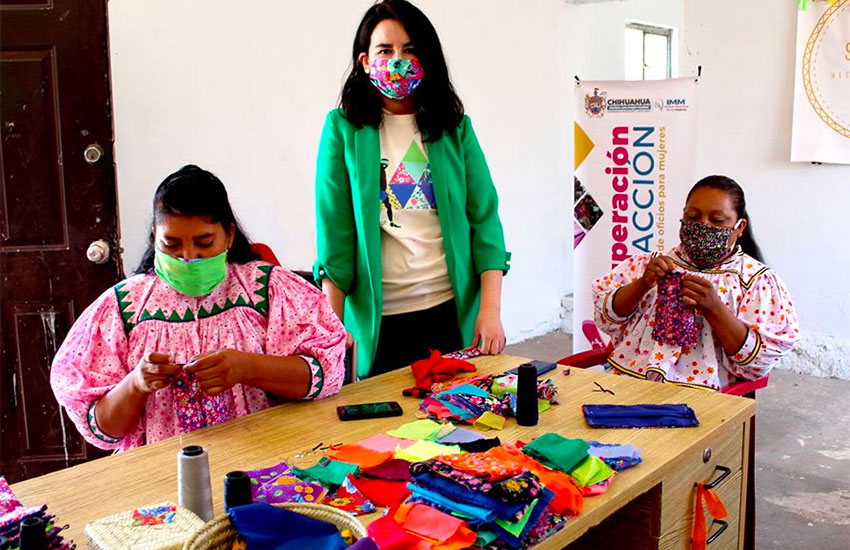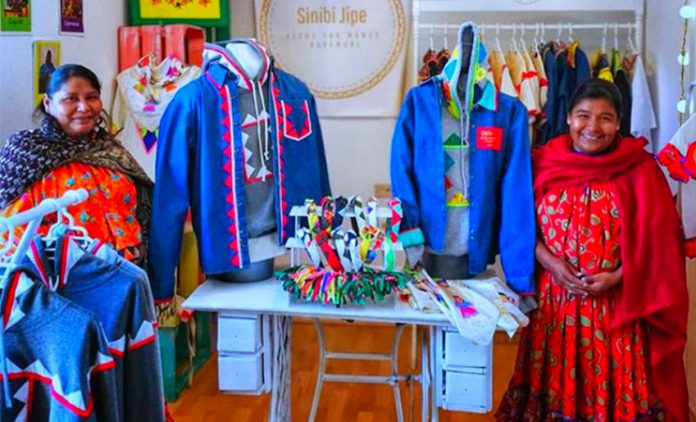At Sinibí Jípe, an artisans’ microbusiness in La Soledad, Chihuahua, recovery from domestic violence is a slow but sure process, occurring thread by embroidered thread.
Of the 20 women at Sinibí Jíbe who create and embroider textiles for sale, 19 were once in abusive relationships. As members of the business, founded a year and half ago to give indigenous domestic violence victims emotional refuge and gainful employment, the women not only gain a path out of abuse but also supportive relationships with other former victims and various forms of counseling.
The business’s mission is threefold: to break the silence that surrounds domestic violence, to give victims economic independence and confidence, and to preserve the cultural identity of the Rarámuri, an indigenous people who have inhabited Chihuahua since before the Conquest, and number about 50,000–70,000, according to a 2006 census.
Founder Luisa Fernanda Martínez told the newspaper Milenio that working at Sinibí Jípe transforms women’s self-esteem and their sense of socioeconomic self-empowerment, highly necessary in the Rarámuri culture where, Martínez said, a woman is unlikely to feel comfortable reporting her abusive partner to authorities.
“But upon knowing that they have a job and that we are with them, it gives them the courage to say ‘enough’ and put a stop to it, to report [their abusers].”

According to Mexico’s National Institute of Indigenous Peoples (INPI), 59% of indigenous women in Mexico have experienced some kind of family violence, economic dependence, or labor discrimination. Thirty-four percent who responded to a government survey said they had been hit or verbally humiliated during childhood.
When new members arrive, they are often disheveled, uninterested and shy. But as time passes, they alter their dress and hairstyle, which Martinez sees as the first signs of emotional recovery.
“It is really great because you see them when they first come in, with heads lowered, disheveled.” After they have been working for a while they take better care of themselves. “Then I know that things are getting better.”
Nevertheless, she said, it’s a slow process, though eventually transformative. As new members adjust to their new surroundings, they receive counseling in regaining their confidence. Martínez hopes that the combination of support, counseling, and education is also planting a seed for the next generations of Rarámurí women, who have traditionally had little access to employment and economic independence.
Members’ artisanal products are recognized with a label that bears not only the business’s name but that of the woman who created it.
Earlier this year, Sinibí Jípe contracted with the airline Volaris to make thousands of face masks, which it handed out free to its customers.
The microbusiness recently received national recognition from the Ministry of Tourism and Mexico Desconocido tourism magazine, which together commissioned the women of Sinibí Jípe to create an embroidered blanket commemorating Mexico’s Pueblos Mágicos, or Magical Towns.
“Each prize and event that they invite us to makes the women more committed to the work that we are doing,” Martínez said. “The business enables them to be well and keep discovering themselves, breaking the silence in which all indigenous women live, so that they can be themselves — free indigenous women.”
Source: Milenio (sp)
